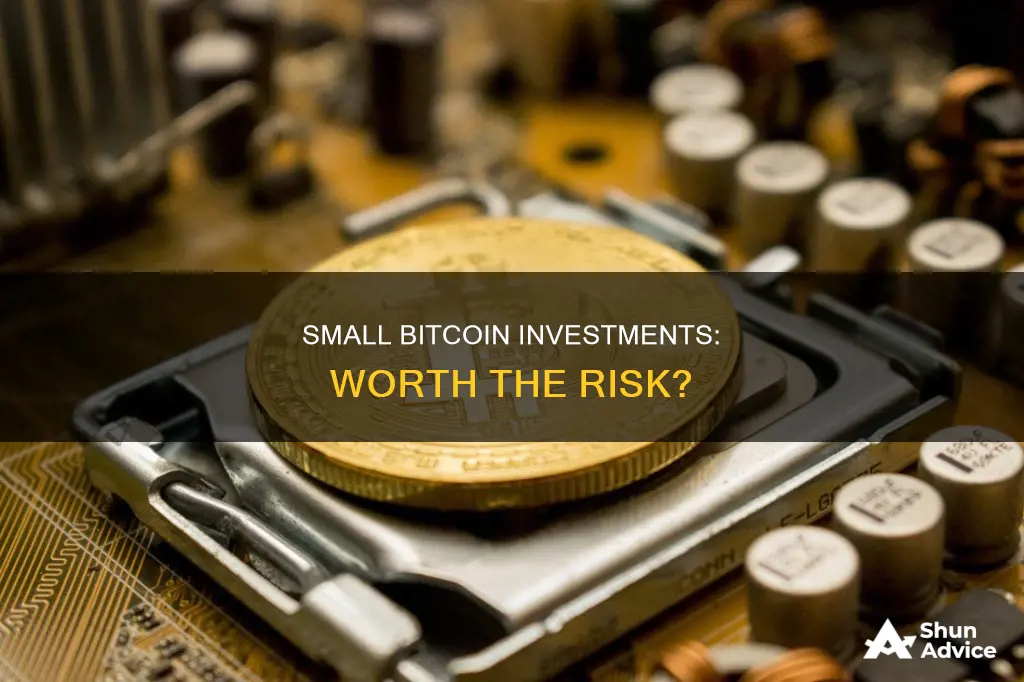
Bitcoin is a decentralised, worldwide, digital currency that is managed without any central authority. It is issued without the involvement of a government, company or bank and is therefore more resistant to wild inflation and corrupt banks. Due to its decentralised nature, Bitcoin is often regarded as a risky investment with high volatility. However, it has historically offered the potential for high returns.
If you are considering investing in Bitcoin, it is important to remember that it is a risky asset and you should only invest what you can afford to lose.
| Characteristics | Values |
|---|---|
| Volatility | Bitcoin is extremely volatile. Its value can rise or plummet in a short time. |
| Accessibility | Bitcoin can be purchased on cryptocurrency exchanges, traditional stockbrokers, money transfer apps, Bitcoin ATMs, and Bitcoin ETFs. |
| Affordability | Bitcoin can be traded as fractional shares, with some crypto exchanges having minimum purchases of $10 or less. |
| Risk | Bitcoin is a risky investment. It is not insured by the Securities Investor Protection Corporation and lacks basic consumer protections. |
| Investor sentiment | Some investors have likened the Bitcoin hype to the dot-com bubble or the Dutch tulip mania from the 1600s. |
| Investor advice | It is recommended to not invest more than 10% of your portfolio in Bitcoin and to only invest money you can afford to lose. |
What You'll Learn

Dollar Cost Averaging
Investing in Bitcoin can be a risky move due to its high volatility. Dollar-cost averaging (DCA) is an investment strategy that can help you invest in Bitcoin in a disciplined and low-stress manner. DCA involves investing a fixed amount of money in Bitcoin at regular intervals, such as weekly or monthly, regardless of the price. This approach helps to reduce the impact of short-term market volatility and removes the need to time the market.
Here's how DCA works:
- Set a budget: Determine how much you are comfortable investing at regular intervals. You can start with a small amount, such as $10, and increase it over time.
- Decide on the intervals: Choose how often you want to invest, such as weekly, bi-weekly, or monthly.
- Find a good platform: Select a reputable Bitcoin exchange or app that allows you to automatically invest in Bitcoin using recurring payments. Examples include Swan in the US, Relai in Europe, and Bitnob in Africa.
- Start investing: Set up regular bank transfers to the platform, and it will automatically purchase Bitcoin for you based on your predetermined settings.
- Secure your Bitcoin: Ensure you use a secure, non-custodial Bitcoin wallet, where only you have access to the private keys, to safely hold your Bitcoin investment for the long term.
DCA is a straightforward and simple way to invest in Bitcoin, even for beginners. It allows you to build your Bitcoin investment over time, even with a small amount of money. By investing at regular intervals, you buy more Bitcoin when prices are low and less when prices are high, averaging out the cost per Bitcoin.
Remember, investing in Bitcoin carries risks, and it is important to only invest what you can afford to lose. DCA can be a wise strategy to consider if you are looking to invest in Bitcoin in a disciplined and stress-free manner, focusing on long-term growth rather than short-term volatility.
Why Bitcoin Belongs in Your Investment Portfolio
You may want to see also

Volatility
Bitcoin is a highly volatile investment. Its value can rise or fall by a large amount in a short space of time. For example, in 2013, the value of Bitcoin fell by 80% and it took three years for it to recover. There were also drops of 50% or more in 2021 and 2022.
Bitcoin's volatility can be attributed to its unregulated nature. Unlike traditional currencies, Bitcoin is issued and managed without any central authority. There is no government, company, or bank in control of Bitcoin. This means that it is more resistant to wild inflation and corrupt banks, but it also means that it is more susceptible to rapid price changes.
Another factor contributing to Bitcoin's volatility is its relatively low liquidity compared to other assets. This means that even small changes in supply or demand can have a significant impact on its price.
To combat the high volatility of Bitcoin, investors can utilise a strategy called Dollar Cost Averaging. This involves investing a set dollar amount on a set schedule, such as once a week or once a month. This strategy helps to smooth out the impact of price fluctuations and reduce the risk of investing a large sum of money at the wrong time.
It is important to remember that investing in Bitcoin is risky and there is the possibility that it could go to zero. As with any investment, it is crucial to understand the risks involved and only invest what you can afford to lose.
TFSA Bitcoin Investing: A Beginner's Guide
You may want to see also

Lack of consumer protection
Investing in Bitcoin and other cryptocurrencies can be risky due to the lack of consumer protection. Unlike traditional financial products, cryptocurrencies are not insured by the Federal Deposit Insurance Corporation (FDIC) or the National Credit Union Share Insurance Fund. This means that if a cryptocurrency company fails—and many have—investors will not be reimbursed by the government.
Additionally, some virtual currency companies do not identify their owners, provide phone numbers and addresses, or specify their location. This makes it difficult for consumers to know who they are dealing with and how to contact the company if something goes wrong. In some cases, cryptocurrency companies may not offer help or refunds for lost or stolen funds. There have been instances where consumers have lost access to their funds due to platform failures, identity verification issues, security holds, or technical issues.
Another concern is the lack of recourse for consumers who have been defrauded or had their accounts hacked. While the Consumer Financial Protection Bureau (CFPB) accepts complaints about virtual currency products and services, there is often little that can be done to recover lost or stolen funds. Scammers often take advantage of the anonymity and lack of regulation in the cryptocurrency space, making it difficult to identify and trace the movement of stolen funds.
The high volatility of cryptocurrencies also poses a risk to consumers. The value of Bitcoin, for example, has been known to drop by as much as 80% in a single day. Consumers who invest in cryptocurrencies should be prepared for this level of volatility and only invest what they can afford to lose.
Overall, the lack of consumer protection in the cryptocurrency market means that investors are largely on their own when it comes to dealing with issues such as fraud, account hacks, platform failures, and volatile exchange rates. It is important for consumers to carefully consider the risks before investing in cryptocurrencies.
Small Bitcoin Investments: Worth the Risk?
You may want to see also

Bitcoin as an asset
Bitcoin is a decentralised digital currency, meaning it is issued and managed without any central authority such as a government, company or bank. It is instead maintained by a decentralised peer-to-peer electronic network that relies on computational proof to authenticate transactions.
Bitcoin is a new asset class, and its value is derived from its ability to function as a store of value and a unit of exchange. It is also highly portable, divisible, and durable.
Bitcoin's value is determined by its users, supply, and demand. Its value has increased over time due to its restricted supply and increasing demand. As a result, it has become an attractive investment option for those with a high-risk tolerance, with some investors choosing to invest small amounts regularly.
However, it is essential to remember that Bitcoin is a highly volatile asset. Its value can fluctuate significantly, and there is a potential for substantial losses. As with any investment, it is crucial to understand the risks involved.
Bitcoin Mining: Recouping Initial Investment Costs
You may want to see also

Storing Bitcoin
- Hardware Wallet: A hardware wallet is a physical device similar to a USB drive that stores your private keys offline. It is designed to be resistant to physical and digital attacks. The device signs transactions internally and only transmits the signed transactions to the computer, never revealing any sensitive data. Examples include the Ledger Nano X and Trezor Model T.
- Multi-Signature Wallet: A multi-signature wallet requires multiple private keys to access the bitcoins, providing an extra layer of security. These keys can be spread across multiple devices, such as a desktop, laptop, and smartphone. In the event of a lost or compromised key, the remaining keys can still access the funds.
- Cold Storage Wallet: A cold wallet, also known as offline storage, generates and stores private keys on an air-gapped computer that is not connected to the internet. It provides protection against online threats like viruses and hackers. Cold wallets can be less user-friendly and impractical for carrying around compared to hardware wallets.
- Hot Wallet: A hot wallet is a single-signature wallet that stores private keys on an online device, such as a mobile phone or laptop. While it offers easy access to your bitcoins, it is more vulnerable to malware and hacker attacks. Hot wallets are suitable for small amounts and day-to-day transactions.
- Custodial Wallet: With a custodial wallet, a third party, such as an exchange or broker, holds your bitcoins in trust. However, this option comes with the risk of the third party being targeted by hackers or engaging in malicious activities. Examples include Coinbase and other centralised exchanges.
It is important to note that regardless of the storage method, backing up your Bitcoin wallet regularly and keeping your software up to date are crucial steps to ensure the safety of your bitcoins. Additionally, consider using a strong password and encryption for added security.
The Ultimate Investment: Bigger Than Bitcoin?
You may want to see also
Frequently asked questions
Bitcoin is a risky investment, so it's important to think carefully about your goals and your strategy before you decide. One common rule of thumb is to invest no more than 10% of your portfolio in individual stocks or risky assets like Bitcoin. If you're not ready to put a large amount of money at risk, you can start small and still get a good grasp of how the process works. Many crypto exchanges have minimum purchases of $10 or less.
There are several ways to invest in Bitcoin, including Bitcoin wallets, cryptocurrency exchanges, traditional stockbrokers, money transfer apps, Bitcoin ATMs, and Bitcoin ETFs.
Bitcoin is a highly volatile asset, and its value can drop as much as it rises. It is also not insured by the Securities Investor Protection Corporation, so there is no protection for investors if an exchange fails or is hacked.
Bitcoin is a decentralised digital currency that is not controlled by any central authority, such as a government or bank. This makes it more resistant to wild inflation and corrupt banks. It also has the potential to be a non-correlated asset, meaning it may not follow the trends of other assets like stocks.
Opinion is divided. Some experts, such as Warren Buffett and Jamie Dimon, believe it is a scam and will have little to no value in the future. Others, such as Michael Novogratz, are supporters of Bitcoin and believe it will continue to increase in value.







